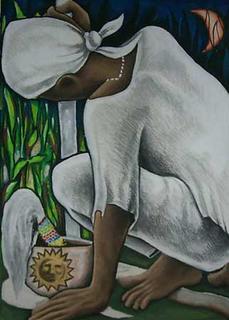Ante Diem VIII Kalendas October

Modern Date : September 24th
Ante Diem VIII Kalendas October
Eighth Day to the Kalends of October
This is one of the dies comitiales when committees of citizens could vote on political or criminal matters.
The second day of the Greater Eleusinian Mysteries was called the halade mystai from hals "to or into the sea." The initiates were commanded to purify themselves by bathing in the sea. After their self-baptism in this holy water, they put on new clothes of linen and were called hydrani.
September is the 'magical' seventh month (after March).
The Going Forth of Isis
Day of Going Forth of Isis is commemorated on the 8th day of Hethera. Ancient Egyptians marked the approach of the planting season by commemorating the death and rebirth of Osiris. There was music, dancing, and ceremonial planting.
"I know the secrets of Hierakonpolis. They are the hands of Heru and this which his mother(Isis) did, throwing them on the water as she said: “You shall say be for me (hands) amputated from me and far away when you are found. Said Ra: This son of Isis has been multilated by this which his mother herself did against him. Pray let him be brought to us, namely Sobek, lord of the farthest marshes, that he may fish them out.” When he had found them, his mother Isis (Caused) them to grow (back to their proper place).”
-Book of the Dead, Chapter 113
Obatala, the King of the White Cloth
In Santeria, this is the feast of Obatala. Obatala, the Orisha of justice, order and peace, whose festival is celebrated with drumming, trance dancing and spirit channeling. In the Yoruba language, Obatala means King of the White Cloth. Mythology says that it was a male Obatala that was sent by Oludumare from heaven to Earth to create the human being and to rule as king, but he is blamed for creating defective humans after getting drunk on palm wine. Humans were meant to be made according to a pattern given by Olodumare. Since that day, Obatala has been forbidden drink, and his children are also forbidden alcohol. In Santeria he is the equivalent of the Catholic saint Our Lady of Mercy.
Our Lady of Ransom/Mercy
This day commemorates the founding around 1218 of the Catholic Order of Our Lady of Mercy in Barcelona. She is also known as Our Lady of Ransom because the main purpose of the order was to ransom captives from the Moors. She is depicted sheltering sinners under her outspread cloak.
